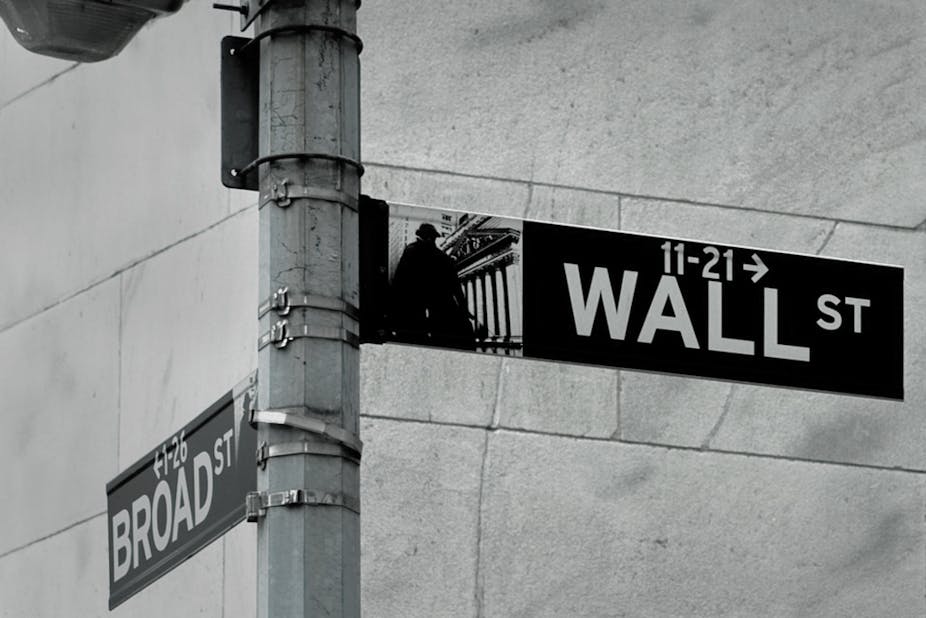The first thing that strikes you when you re-read the “Declaration” issued in autumn 2011 by the Occupy protesters assembled in Zuccotti Park in downtown Manhattan is how little of it actually relates to Wall Street.
Many of the “demands” inserted into the manifesto drafted by the various grassroots organisations behind the protest have no relation to how Wall Street functions, or to the issues that have arose since the credit crunch led America (and much of the developed world) into this Great Recession.
Following the age-old agitprop dictum that no good popular uprising should go to waste, it seems that a variety of other concerns, such as student loans, public employees pensions, animal rights and genetically-modified food, were the principal concerns of many of Occupiers. The complexities and intricacies of Wall Street and the City of London were largely ignored, except for a few cursory statements about bank bailouts and excessive compensation that have been stapled on to their wishlist.
The initial choice of venue – the financial district in Manhattan – gave the protesters a chance to air other long-standing grievances in a different location. But frustratingly little of what was said, sung, chanted and painted on signs was actually directed at the way the global financial systems currently operate and how these practices could be improved. Few men and women who work on Wall Street or in the City of London would make the claim that modern financial markets have achieved some variant of divine perfection. These markets exist as a result of human endeavours and, as a result, they are subject to human frailties and flaws. There is always room for improvements.
Ultimately, though, an attempt at a direct and informed critique of the operation of the global financial system was frustratingly absent from the Occupy demonstrations.
Simply put, the process of connecting savers with borrowers, and providers of capital with users of capital, requires intermediation. This need for intermediates creates a need for savings banks, stock markets, brokerage firms, mutual funds and investment banks. Otherwise, it would be practically impossible to put Uncle Edgar’s or Aunt Edna’s pension contributions into the hand of the corporate treasurers of either Apple or Facebook, or the public coffers of various governmental agencies who fund their operations based on bond issuances.
What we call “Wall Street” is a significant component of this intermediation infrastructure. Unless we move away from a monetised economy, and opt in favour of bartering on a scale never seen before, then the intermediaries must remain.
There will always be valid criticism that can be made about any industry, and Wall Street is no exception. To the extent that the demonstrators in Zuccotti Park would have coalesced around a few convincing compelling themes directly relevant to improving the financial infrastructure and ensuring that Wall Street is successful at spurring economic growth for the United States and its citizens (as well as in other developed and developing countries around the world), then they could very well have had a meaningful and lasting impact.
Since the Occupiers’ demands remained vague and ambiguous, distracted by an amorphous assault on rhetorical bogeymen and unable to propose clear and specific criticisms, then it was always highly unlikely that they would have anything like the impact that they desire and deserve. Just “wanting change” is never enough.
It is easy to talk about the contest between “Wall Street” and “Main Street”. It is a simple analogy and, like most simple analogies, it can be very compelling. It is an oversimplification to say that Wall Street must exist for the purpose of serving Main Street.
The problems that Main Street faces could be solved locally, without recourse to the financial markets that Wall Street and other financial centres orchestrate. Investors, savers, borrowers and issuers turn to these financial centres because they are in search of returns that are higher, or funds that are less expensive, than they can obtain in their own local communities.
Operating as a middleman, investment banks earn lucrative profits by matchmaking investors with investment opportunities. As more money is funnelled into the financial markets, there are more opportunities to trade in these investments and potentially earn further profits based on which was the market moves over the short-, medium- and long-term.
The great linguistic contribution of the Occupy Wall Street movement - and perhaps its only lasting contribution - was mainstreaming the propaganda terms “the 1%” and “the 99%.” On both sides of the Atlantic, as economies remain fragile and unemployment stubbornly high, identifying with the 99% has resonated with many earners and savers who are having difficulty navigating the new financial landscape.
Eyes are increasingly turning to the so-called 1%. What is the proper role of the ultra-wealthy in addressing these issues? What should we expect from the private equity and hedge fund professionals who earn large sums of money from their investment acumen?
Interestingly, simply being wealthy does not appear to be enough to earn someone the negative sentiment that is directed at the 1% by the Occupiers and their sympathisers. It is curious how the bright lights of media coverage that follow around a lottery winner do not invoke the vitriol and judgemental language that a large Wall Street bonus does. This is particularly true if one gives any thought to the shockingly low payout rates of lotteries and how they disproportionately prey on the wallets of the working poor.
Is it right that money won by sheer luck from gambling should be considered morally superior to money that was earned through work? What is it about the manner in which the 1% are commonly believed to have acquired their fortune is giving these critics so much concern?
These are the difficult questions which Wall Street ultimately needs to answer in order to make its case to its critics and retain the support of its champions.

